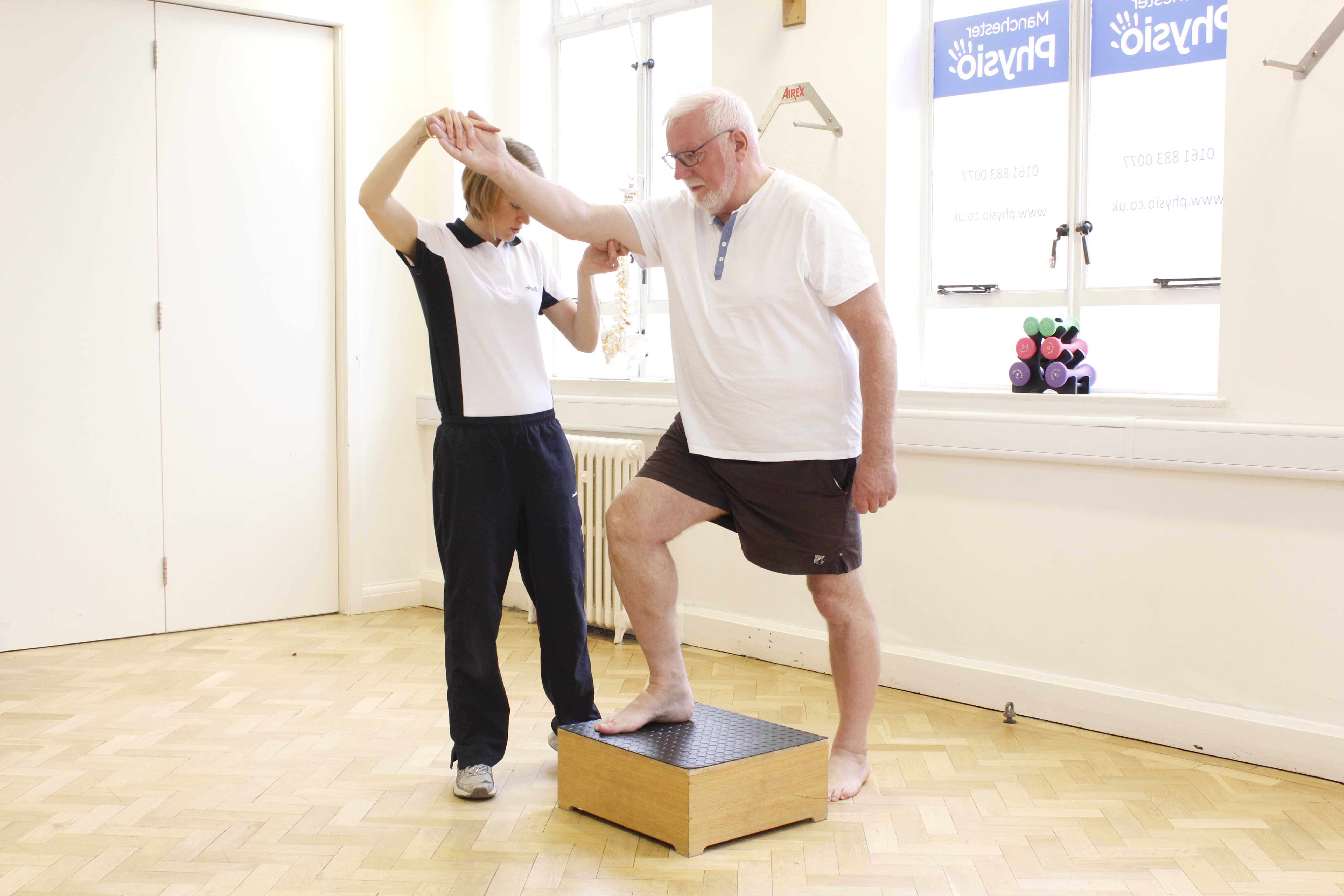Symptoms of angina
Angina may be felt in the chest, jaw, back or neck and is often described as a heavy, tight, burning sensation. The discomfort may be experienced alongside breathlessness, nausea and sweating.
 Above: Progressive exercises tolerance workouts supervised by an experienced physiotherapist
Above: Progressive exercises tolerance workouts supervised by an experienced physiotherapistCauses of angina
The heart is a muscle that requires oxygen to work effectively. If there is a blockage in the arteries which supply the heart with oxygen rich blood, the heart muscle spasms. The pain caused by the heart having a spasm is known as angina.
Diagnosis of angina
If your doctor suspects you have angina, they will request an electrocardiogram (ECG) to monitor your heart rate. Your doctor may ask you to wear the ECG monitor whilst having a brisk walk/ jog on the treadmill to monitor your heart rate before you provoke the symptoms of angina.
Another method to aid diagnosis of angina is to have a coronary angiogram. This involves the insertion of a dye via a catheter into your femoral artery in your groin. The dye allows your doctor to see blockages in your arteries that may be causing the symptoms of angina.
Treatment for angina
Firstly, the treatment for angina involves identifying the cause of the blocked coronary arteries that are causing angina. Some of the modifiable factors that increase the likelihood of narrowed arteries are blood pressure, cholesterol, obesity, smoking, alcohol intake and level of fitness. Non-modifiable risk factors are increasing age, a family history of heart disease or co-morbid conditions such as diabetes.
With professional help it is possible to control and reduce some of these modifiable risk factors for example; there is medication to reduce blood pressure and cholesterol. Obesity can be managed with dietary advice and promotion of exercise as part of a healthy lifestyle. However, other risk factors (age, diabetes, family history) are non-changeable and need to be carefully monitored.
In order to reduce the symptoms of angina it is important to seek medical advice re: blood pressure and cholesterol. It is vital to stop smoking, reduce your alcohol intake and improve your diet and lifestyle. A physiotherapist at Physio.co.uk can help you gradually improve level of fitness and exercise tolerance whilst reducing your body mass index (BMI).
Physiotherapy for angina
An experienced physiotherapist will assess your muscle strength, levels of pain and cardiovascular fitness. Assessment can be provided at home or in one of our clinic locations. The findings of the assessment will be discussed and you will have the opportunity to set specific goals with your therapist. An example of a short term goal is to walk ten meters with a stick within two weeks. A longer term goal could be to swim three lengths of the swimming pool in five minutes. Every individual’s goals are different and depend upon your current level of fitness, your hobbies and ambitions. Your physiotherapist will work closely with you to help you achieve these goals in an appropriate time frame. The treatment sessions for an individual with angina may work on:
- Cardiovascular exercise
- Fitness and stamina
- Flexibility and range of movement
- Core stability and dynamic balance work
- Weight management
- Lifestyle changes
Individuals with angina substantially benefit from regular physiotherapy sessions. The wide variety of benefits include:
- Increased cardiovascular fitness
- Increased flexibility and range of movement
- Exercise in confidence with the supervision of a specialist physiotherapist
- Decrease your risk factors for further cardiovascular problems
- Learn the best exercises for you to do in the gym or at home
- Learn how to integrate fitness and exercise into your daily routine
- Maintain your motivation to keep your risk factors under control
- Access to a gym or hydrotherapy pool
Why Physio.co.uk for treatment of angina
At Physio.co.uk we understand the frightening discomfort of angina. It is essential that you reduce your risk factors to prevent further episodes of angina. Physio.co.uk can help you do this via 1:1 individual exercise sessions in the gym or clinic to improve your fitness and stamina.
- Experienced, understanding physiotherapists
- Treatment at home, in clinic or in your local gym
- Set specific targets and goals to achieve in an appropriate time frame
- Provision of an individualised home exercise program
- Access to specialised gymnasium
- Access to hydrotherapy swimming pool
- No waiting lists

 0330 088 7800
0330 088 7800





































